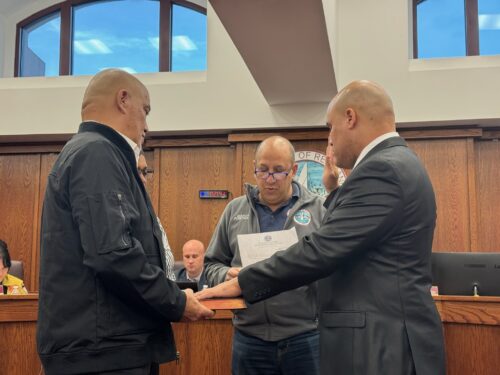
By JOHN T. WARD
With its liquor license on the line, Red Bank’s most problematic bar reached a temporary compromise with borough leaders Wednesday night that will give it time to prove it has gotten its chronic problems under control.
Mike Gilson, owner of Fixx on West Front Street, agreed to implement more than a dozen fixes he negotiated with police Chief Steve McCarthy over the past two months in an effort to reduce the need for police presence at closing time. Many of the changes, including beefed-up security Thursday through Saturday nights, have already been implemented, Gilson said.
But one change McCarthy insisted on led to a stalemate: he wanted Gilson to shut off the music at 1:15 a.m. in order to encourage a peaceable wind-down to a 2 a.m. closing. Gilson refused, saying it would kill his business.
“It seems like a small matter to the average person, but we wouldn’t be here if we didn’t think that was a very, very important aspect of our ability to function in this economy,” Gilson’s lawyer, Rob Williams, told the council.
“It’s not that people are going to leave at 1:15 because the music’s off,” Williams said. “They’re not going to come. That’s the real problem.”
Fixx, like its predecessor Chubbys Waterside Cafe‘s, found itself in hot water back in June over repeated calls to the police, which council members cited when they refused to renew the bar’s liquor license. That forced Gilson to make a trip to Trenton to appeal to the state Alcohol Beverage Control division for a temporary license.
The bar has a history of problems. It was the scene of an October 2007 donnybrook that took cops from several towns to quell. Later, the council banned ‘ college nights, a moved clearly aimed at Chubby’s, which allowed people under the legal drinking age of 21 into the club.
McCarthy told the council that in terms of recent arrests and calls for disorderly persons, noise and other offenses, Fixx is “number one, or in one case number two, in every category” among Red Bank watering holes, a pattern of behavior that diverts scarce department resources, he said.
“It impacts our ability to police other bars,” McCarthy said.
McCarthy said he had a good working relationship with Gilson, and noted that many of the elements of the “special conditions” he was recommending to the council came from Gilson himself. They include keeping all doors and windows shut when music is playing; posting a “patron code of conduct;” banning anyone who’s been arrested on or ejected from the property; and immediately reporting actual or imminent criminal activity to the police. Gilson is also to meet monthly with McCarthy to review policies and activities.
The music cut-off time, though, was a deal-killer. Williams said that because of changes in bar patronage in recent years, customers are showing up later, with the majority of Fixx’s clientele on a Friday or Saturday arriving after midnight.
Williams made no attempt to hide his intent to appeal the council’s decision if it adopted McCarthy’s recommendations wholesale. That, he said, would cost both Gilson and the borough a lot of money.
Instead, he asked they council to allow Gilson to unplug all live and recorded music at 1:30 a.m., instead of the present shut-off time of 1:45, for the next 90 days, after which the governing body would revisit the question of whether a 1:15 switch-off was needed.
“After 90 days, you have to tell us what the problem is,” he said.
The council, after a 20-minute closed-door discussion, agreed.
Councilman Art Murphy, who serves as police commissioner, made the motion for the compromise without comment, though he had earlier expressed frustration with Gilson’s refusal to accept McCarthy’s demand.





















